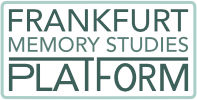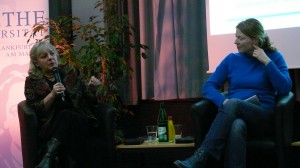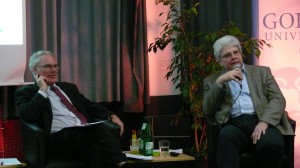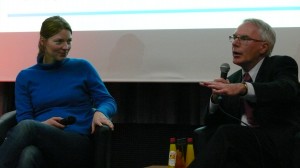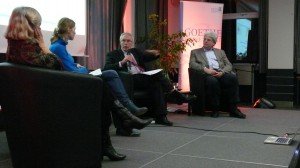 National Celebrations and Cultural Memory in Multicultural Societies
National Celebrations and Cultural Memory in Multicultural Societies
Panel discussion on the significance of national memorial holidays such as Australia Day or ANZAC Day
Click here to see a video recording of the panel discussion.
Participants:
Prof Rae Francis and Prof Bruce Scates (Monash University, Melbourne),
Prof Astrid Erll and Prof Frank Schulze-Engler (Goethe University, Frankfurt)
Abstract:
The panel will discuss how modern societies deal with contested events of their national histories. How does perception change over time and which ideological messages are transmitted today? Who is addressed, who is included, and who is not? Australia Day and ANZAC Day serve as examples, celebrating events that some Australians seem to proudly perceive as the origin of modern Australia, while other Australians predominantly see them as the beginning of European invasion of the continent, suppression, and suffering, or as a national myth that excludes indigenous people as well as later generations of migrants. Many other Australians, often with a more recent history of migration (e.g. from continental Europe or Asia), might not ascribe much relevance at all to either memorial day and simply enjoy the public holiday.
It is the dynamics of collective memory, increased amongst others by modern media, that shape cultural identities, both on an individual as well as national level. While politics might draw on such events in order to create a national identity – and again the question to be discussed here is: who is addressed, who is included, and who is not? – there is also a more subliminal level of negotiation and perception within society. The panel will discuss the importance, the meaning, and the legacies events such as as Australia Day or ANZAC Day have for a multicultural, plural society, on the macro level of politics and the micro levels of family, work place, or school yard.
Research regarding these questions – and finding possible answers – is one of the core competences of fields such as Postcolonial, Transcultural, and Memory Studies within the context of Literature and Cultural Studies. The developments of and within societies, both historically and synchronically, are reflected and shaped by literature and other media. Literature and Cultural Studies need a global academic network in order to meet the globalized challenges of modern societies described above. The critical interdisciplinary discussion of Australian national celebrations serves as an excellent example for applied academic exchange in a globalized world. The collaboration between Goethe University Frankfurt and Monash University Melbourne provides the infrastructure necessary for a sustainable academic research and learning environment.
Speakers and Panel Members:
Prof. Astrid Erll, Goethe University Frankfurt
Astrid Erll is Professor of Anglophone Literatures and Cultures at Goethe University Frankfurt. She has worked on memories of the First World War, the Spanish Civil War, British colonialism in India and the Vietnam War. She is general editor of the book series Media and Cultural Memory (de Gruyter, since 2004), co-editor of A Companion to Cultural Memory Studies (with A. Nünning, 2010), Mediation, Remediation, and the Dynamics of Cultural Memory (with A. Rigney, 2009), and author of Memory in Culture (Palgrave 2011) / Kollektives Gedächtnis und Erinnerungskulturen (2005, 2nd ed. 2011), an introduction to memory studies.
Prof. Frank Schulze-Engler, Goethe University Frankfurt
Frank Schulze-Engler is Professor of New Anglophone Literatures and Cultures at the Institute for English and American Studies at Goethe University Frankfurt. His research interests include African, South Asian and Caribbean literatures in English, indigenous literature in Canada, Australia and New
Zealand, comparative perspectives on Anglophone literatures and cultures, transculturality in literary and cultural studies, postcolonial theory and the cultural dimensions of globalisation. Recent publications include co-edited volumes on Transcultural Teaching (with Sabine Doff, Beyond ‘Other Cultures’: Transcultural Perspectives on Teaching the New Literatures in English, 2011) and Anglophone African Literatures (with Geoffrey V. Davis, African Literatures, 2013).
Prof. Rae Frances, Monash University Melbourne
Raelene Frances was born in Collie, Western Australia and is a graduate of the University of Western Australia (BA. Hons and MA) and Monash University (Ph.d). She has published on the history of work, women’s history, Aboriginal/European contact history, religious and community history and has also co-edited several collections of essays on Australian and New Zealand history. Her books include The Politics of Work, which won the Australian Historical Association’s Hancock Prize, and Women and the Great War (co-authored with Bruce Scates), which won the New South Wales Premier’s History Prize. She has recently completed a book-length history of prostitution in Australia, Selling Sex, which was short-listed for the Ernest Scott History Prize. She is a Fellow of the Academy of Social Sciences in Australia. Rae Frances has taught Australian history, women’s studies, New Zealand history and Australian studies at universities in Melbourne, Perth and Auckland.
Prof. Bruce Scates, Monash University Melbourne
Bruce Scates has taught Australian History and Australian Studies in universities across Australasia, including the University of New South Wales, Murdoch University and the University of Auckland. Professor Scates is the recipient of National, State and Faculty awards for excellence in teaching, sharing several of these achievements with his colleague, Professor Rae Frances.
Professor Scates has served on a number of state and national committees including reviews of the West Australian History syllabus, the NSW History Awards, the Australian Society for the Study of Labour History, the Executive Committee of the History Council of NSW and the Australian Army History Unit. In 2005-6, he was a member of an expert panel convened to recover the bodies of men missing from the Great War and he is the author of a submission to the Senate Inquiry into controversial road works at Gallipoli. He has also led several historical tours of the battlefields and commemorative sites of the Great War, including the Premier of Victoria’s ‘Spirit of Anzac’.
Bruce Scates’ work on Indigenous Australia and the memory of the frontier received special commendation in the first report of the Council for Aboriginal Reconciliation. He has organised a number of scholarly forums including a Round Table discussion of the memory of the Great War at the International Congress of Historical Sciences, the Inaugural Monash Arts Public Lecture and the National Conversation Series convened by the National Centre for Australian Studies.
His publications include Return to Gallipoli: Walking the Battlefields of the Great War (Cambridge 2006); A Place to Remember: A History of the Shrine of Remembrance, and Women and the Great War (Cambridge 1998, co-authored with Rae Frances). His imagined history of Gallipoli, On Dangerous Ground (UWA publishing 2012) has been listed in the first national curriculum for literature and received special commendation in the Christina Stead Award. His next book is a collaborative study of pilgrimage and memory. Anzac Journeys: Returning to the Battlefields of World War Two will be published by Cambridge in August.
